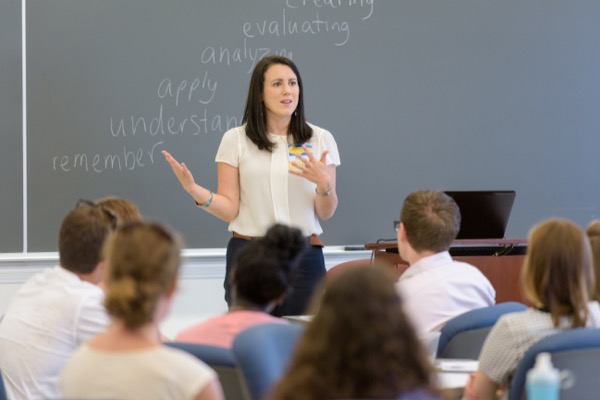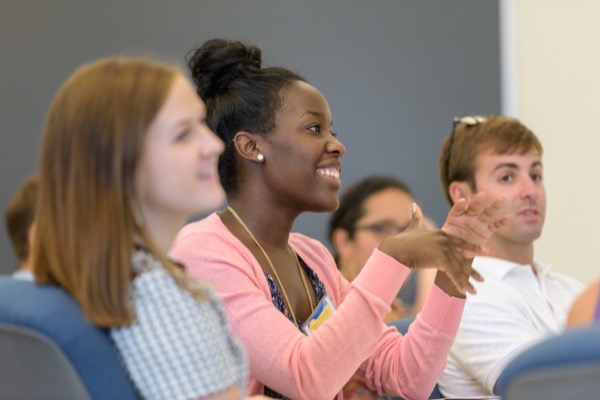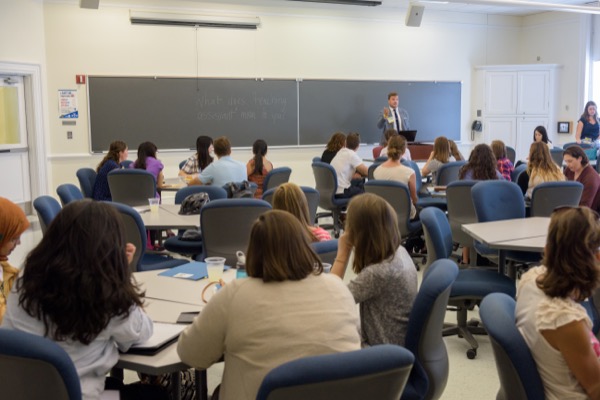


Research, teaching, learning
UD joins network to strengthen graduate students' teaching skills
11:47 a.m., March 7, 2016--The University of Delaware has joined the Center for the Integration of Research, Teaching and Learning (CIRTL)’s international network of top research universities dedicated to advancing the teaching of science, technology, engineering and mathematics (STEM) disciplines in higher education through future faculty professional development work with Ph.D. candidates and postdoctoral fellows.
“It is an honor to welcome such a distinguished institution as the University of Delaware to our network,” said Robert Mathieu, director of CIRTL, which was established at the University of Wisconsin in 2003 with support from the National Science Foundation.
Campus Stories
From graduates, faculty
Doctoral hooding
UD’s membership will mean enhanced opportunities for graduate students to improve their teaching skills, not only through on-campus training opportunities but also through courses and programming offered online and in hybrid formats by other CIRTL Network member institutions.
While CIRTL’s top priority is improving undergraduate STEM education and the retention of historically underrepresented students in STEM, graduate students from disciplines throughout the University will also be able to participate in and benefit from CIRTL opportunities.
UD’s selection for membership is part of an expansion of the CIRTL Network that was completed in February, more than doubling the size of the network this year. Now with 46 members, CIRTL institutions produce more than one-third of all U.S. doctoral degrees in STEM.
According to Kitch Barnicle, executive director of CIRTL, graduate studies in STEM fields have traditionally emphasized research rather than teaching.
“As a matter of fact, new professors often face their first classes of students with little preparation in teaching,” he said. “Our goal is to develop great researchers who also are great teachers, not one or the other.”
UD’s CIRTL core planning group includes faculty and administrators in two STEM departments, biology and math, that produce high numbers of doctorates who stay in the academy rather than pursuing careers in industry. These departments are also playing key roles in improving STEM undergraduate education at UD.
“Initially, we expect to work most closely with faculty in biology and chemistry in developing our CIRTL programming, mainly because we see the graduate student teaching assistants in the Harker Interdisciplinary Science and Engineering Lab’s integrated first-year science curriculum as a very important target group for CIRTL professional development work,” said Ann Ardis, senior vice provost for graduate and professional education. But the longer-term goal, she noted, is to support a “robustly multidisciplinary” local CIRTL learning community.
The importance of developing strong teaching skills among future faculty members is clear, Ardis said: “Graduate preparation in teaching is the best way to improve undergraduate instruction and retention.”
Deborah Allen, professor of biological sciences and director of the Institute for Transforming Undergraduate Education at UD, who is the University’s institutional lead for CIRTL, said the new or expanded initiatives offered through participation in the network will be a critical part of graduate education.
“I think the biggest change will be a scholarship component to the professional development of teaching skills,” Allen said. “Being part of CIRTL will connect us to resources as part of a national network dedicated to strengthening teaching. And for graduate students, having these kinds of teaching skills and experience, in addition to research and scholarship experience, can only help them when they’re in the academic job market.”
CIRTL initiatives offered at UD will develop over time, but Allen said plans include incorporating initiatives into graduate student orientation sessions, expanding mentoring experiences focused on teaching and increasing participation by graduate students in the current Faculty Commons resource that emphasizes best teaching practices.
With the support of the new network membership, UD also plans to reactivate its Higher Education Teaching Certification program, which for many years offered four courses in which graduate students could develop their teaching skills. Currently, the Center for Teaching and Assessment of Learning (CTAL) offers two courses, and Allen said plans are to expand the offerings.
“We’ll come back with an enriched version of that [certification program], which was very successful,” Allen said. “Some graduate students will go into research or work in industry, but for those going into academia, I’ve seen a lot of interest in developing strong teaching skills.”
Cheryl Richardson, associate director of CTAL, agreed that opportunities through CIRTL “will have a broad impact” on graduate education at the University.
“I think this will give a huge boost to the professional development of graduate students,” she said. “Not every graduate student gets the opportunity to be a teaching assistant, so these kinds of programs can help them in exploring teaching and learning. And they’ll have the chance to share their work nationally, through the network, which will benefit them and the University.”
CIRTL hosts numerous web-based workshops and discussions each month. In March, for example, the theme is “Inclusion,” and topics range from creating inclusive research labs in specific STEM fields to using your international background to your advantage in the classroom. Offerings can be found at this website.
More about CIRTL
CIRTL stresses the use of successful, evidence-based strategies proven to promote active learning and to help STEM students from all backgrounds succeed and complete their degrees.
Teaching strategies include connecting classroom topics to real-world situations, promoting inclusive learning, encouraging teamwork through shared projects and study groups, continually assessing student progress and using research skills to advance effective teaching practices.
As a new member, UD will develop its own programs built on the CIRTL core ideas of teaching as research, learning communities and learning through diversity.
This new local learning community will offer its own robust schedule of courses, programs, events, internships and resources. In addition, it will collaborate on cross-network projects with CIRTL partners and participate in national offerings.
The project is operated within the Wisconsin Center for Education Research at the University of Wisconsin-Madison School of Education and is supported by the National Science Foundation, Great Lakes Higher Education Corporation and Affiliates and the Alfred P. Sloan Foundation.
Article by Ann Manser
Photos by Evan Krape










